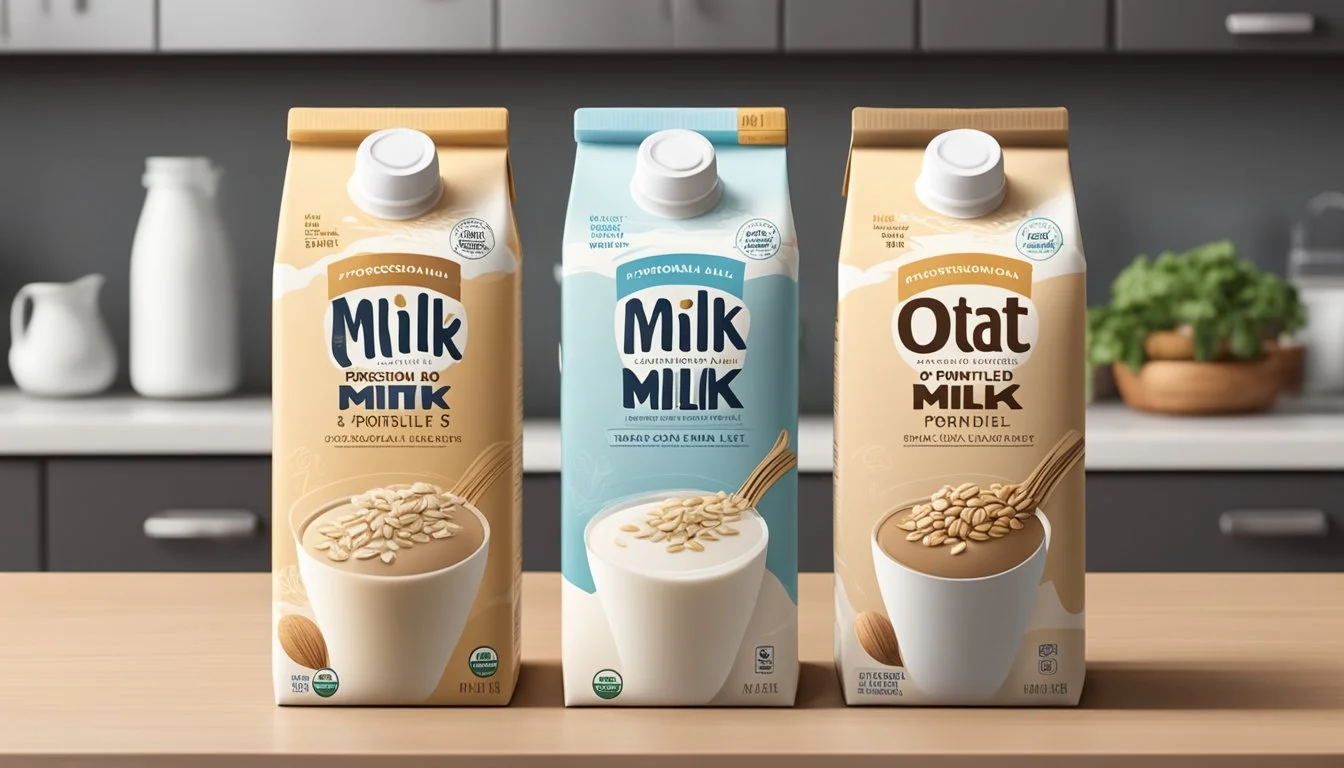Oat Milk Substitutes
Top Plant-Based Alternatives for Your Diet
Oat milk has carved out a significant niche among plant-based milk alternatives due to its creamy texture and nutritional profile. As a preferred dairy alternative, it caters to vegans, vegetarians, and lactose-intolerant individuals seeking a cruelty-free and environmentally friendly option. Its high fiber content and the absence of cholesterol make it a heart-healthy choice, while being naturally sweet without the need for added sugars.
However, dietary restrictions or taste preferences can lead individuals to explore other substitutes. Plant-based milk varieties are diverse, offering a range of flavors and benefits. Substitutes like cashew milk provide a lower-calorie option with healthy fats while maintaining a creamy consistency similar to oat milk. Flax milk is another alternative gaining popularity for its light taste and comparable texture, which can seamlessly replace oat milk in various recipes.
These dairy-free alternatives not only enrich the culinary experience but also cater to specific dietary needs, making them essential staples in modern kitchens. Whether seeking a lower calorie count, avoiding allergens, or pursuing a certain nutrient profile, there is an array of plant-based milks available to serve as substitutes for oat milk.
Benefits of Oat Milk As a Dairy Alternative
Oat milk offers a nutritious dairy-free substitute that caters to those seeking a plant-based diet, providing a blend of essential nutrients conducive to health without the cholesterol found in cow's milk.
Nutritional Profile of Oat Milk
Oat milk is typically enriched with vitamins and minerals to match or exceed the nutritional value of dairy milk. A typical serving contains a range of B vitamins, calcium, and is often fortified with vitamin D. It's a source of fiber, unlike cow's milk, and it provides a dairy-free option for those who are lactose intolerant.
Table 1: Essential Nutrients in Oat Milk (per serving)
Nutrient Amount Calories ~100-130 Protein ~2-4g Fat ~2.5-5g Fiber ~1-2g Calcium ~276mg Potassium ~350mg
Comparing Calories and Fat Content
Oat milk usually contains more calories than other plant-based milks, but less fat compared to cow's milk. It is often chosen for its low saturated fat content, which makes it a heart-healthy option. The calorie content of oat milk can vary depending on whether it is sweetened or fortified.
Comparative Chart: Oat Milk vs. Cow’s Milk (per serving)
Aspect Oat Milk Cow's Milk Calories ~100-130 ~122-149 Total Fat ~2.5-5g ~4.8-8g Saturated Fat ~0.5g (approx.) ~3g
Oat Milk’s Impact on Health and Disease
Oat milk is a positive choice for maintaining heart health due to its low saturated fat content and absence of cholesterol, which are factors in heart disease. Its fiber content can support digestive health and may have a role in regulating blood sugar levels. As it's dairy-free, oat milk is suitable for individuals with lactose intolerance or dairy allergies. Regular consumption provides plant-based protein and fiber, along with essential vitamins and minerals, making it a beneficial component of a balanced diet.
Plant-Based Milk Varieties
With the rise of dietary preferences and allergies, plant-based milk varieties have become indispensable. They offer essential nutrients like protein and calcium while being a vegan-friendly and dairy-free alternative to traditional dairy milk.
Nut Milks and Allergy Considerations
Nut milks, like almond milk and cashew milk, are popular dairy substitutes due to their creamy texture and beneficial nutrients. Almond milk is particularly noted for its high calcium content, sometimes exceeding that of dairy milk. However, nut milks are not suitable for everyone, notably those with nut allergies. While cashew milk is lower in calories and carbohydrates when compared to oat milk, it must be avoided by individuals with nut allergies.
Soy and Pea Milk: Protein-Rich Options
Soy milk stands out among plant-based alternatives due to its complete protein profile, containing all essential amino acids, which are necessary for bodily functions. It is also budget-friendly, making it an accessible option for many. Similarly, pea milk offers a high-protein alternative with a neutral taste, often fortified with pea protein isolate to enhance its protein content without the addition of common allergens.
Coconut and Hemp Milk: Flavorful Fats
Coconut milk is recognized for its distinctive taste and content of beneficial fats, which add a rich flavor to various dishes. It's higher in saturated fat compared to other plant-based milks, so moderation is key for those monitoring their fat intake. Hemp milk, made from the seeds of the hemp plant, is another option providing a good balance of omega-3 and omega-6 fatty acids, contributing to a healthier fat intake.
Rice and Flax Milk: Alternatives for Dietary Restrictions
For those with multiple dietary restrictions, rice milk is an excellent nut-free and lactose-free option. Boasting a naturally sweet flavor, it complements drinks and cereals, but is lower in protein and contains more carbohydrates. Flax milk is an underrecognized option that caters to both gluten-free and nut-free diets. Made from flaxseeds, it's a source of alpha-linolenic acid (ALA), an important omega-3 fatty acid, with some brands being fortified with additional nutrients.
Choosing a Milk Substitute
When selecting a milk alternative to replace oat milk, one should consider taste preferences, how it might be used in cooking and baking, and its nutritional profile. This ensures the substitute aligns with both culinary needs and health goals.
Taste and Texture Preferences
Consumers often look for a milk alternative that closely mimics the taste and texture of oat milk, which is known for being creamy and smooth. Cashew milk is a popular choice as it offers a similar creaminess with fewer calories and a lower carbohydrate count. On the other hand, those preferring a lighter texture might opt for almond milk, which is also rich in vitamin E but has a more distinct, nutty flavor.
Cooking and Baking Versatility
When it comes to cooking and baking, the behavior of milk substitutes can vary greatly. Coconut milk is high in fat and imparts a rich flavor, making it suitable for certain savory dishes and desserts. However, it may not be ideal for all recipes due to its pronounced taste. Those seeking an allergen-free option that performs well in various culinary applications could consider soy milk, as it possesses a balanced fat and protein content that resembles that of cow's milk.
Considerations for Health and Nutritional Needs
It is crucial to assess the health and nutritional impact of a milk substitute. Consumers seeking to manage their weight might prefer milk alternatives with lower calorie content such as cashew or almond milk. However, for individuals with nut allergies or those looking for a higher protein content, soy milk can be a beneficial choice since it provides a good amount of protein. Some plant milks may contain added sugars; reading labels is important for those monitoring sugar intake for health reasons. Furthermore, variants such as hemp milk can offer additional benefits like omega-3 fatty acids, which are important for heart health.
Environmental and Ethical Factors
When considering oat milk and other plant-based milk alternatives, two critical aspects come to the forefront: the sustainability of these options and the ethical considerations related to animal welfare. Both dimensions form the bedrock of consumer choice in the context of plant-based vs. animal products.
Sustainability of Plant-Based Milks
The environmental impact of plant-based milk alternatives is often compared favorably to that of dairy milk. For instance, oat milk requires significantly less land and water to produce than cow's milk. A glass of dairy milk, based on studies, needs upwards of 650 square meters of land annually, which overshadows the amount required for producing the same quantity of oat milk.
Water Usage: Plant-based milks commonly use less water than dairy farming. Cows require substantial volumes of water for drinking, maintaining hygiene, and growing feed, contributing to higher water footprints.
Greenhouse Gases: Dairy milk production is associated with higher emissions of greenhouse gases, primarily due to methane from cows. Plant milks generally have lower carbon footprints.
Animal Welfare and Plant Milks
Moving away from dairy milk to plant-based alternatives such as oat milk also reflects an ethical choice focused on animal welfare. Dairy farming has been critiqued for the ethical treatment of animals, with concerns ranging from the living conditions to the separation of calves from their mothers.
Humane Practices: Plant milks eliminate the need for animal husbandry, inherently avoiding issues related to animal confinement and treatment.
Ethical Considerations: For consumers, choosing plant-based milk can align with a desire for more ethical consumption, dodging the moral complexities involved in the use of animal products.
The choice of oat milk and its alternatives stems from a confluence of seeking a more sustainable and ethical approach to consumption, merging environmental sensibility with a commitment to reducing the reliance on animal products. Such choices are increasingly viewed not just as healthier options but as essential actions toward a more sustainable and ethical food system.
Practical Tips for Milk Alternatives
Selecting the right milk alternative often requires careful consideration of ingredients and a willingness to experiment with homemade options. Understanding labeling and mastering simple preparation techniques can lead to healthier and tastier choices.
Reading Labels and Understanding Ingredients
When choosing a milk substitute, one must be vigilant about reading labels. Milk alternatives, such as almond milk, cashew milk, and soy milk, often contain a variety of additives and ingredients. Gums and thickeners like guar gum or carrageenan may be added to improve texture. These products may also contain flavors, sweeteners, or salt to enhance taste. For those with dietary restrictions, careful attention should be paid to ensure that the product does not contain unwanted components.
Vitamins: Many non-dairy milk options are fortified with vitamins such as Vitamin D and B12; checking for these can be important for nutritional purposes.
Sweeteners: Look for terms like 'unsweetened' to avoid added sugars.
Thickeners and Gums: These are often added to improve consistency but can cause digestive issues for some individuals.
Understanding the specific ingredients and their roles can help consumers make informed decisions that align with their health goals and dietary needs.
Homemade Milk Alternatives: Blending and Straining
Creating homemade non-dairy milk allows for complete control over the ingredients. The process typically involves soaking, blending, and straining nuts or grains. For instance, one can make almond milk by soaking almonds overnight, blending them with water, and then straining the mixture to remove the solids.
Steps for making a typical nut-based milk alternative:
Soak 1 cup of nuts in water for 8-12 hours.
Drain and rinse the nuts, then blend with 4 cups of fresh water until smooth.
Strain using a nut milk bag or cheesecloth to separate the pulp from the liquid.
The resulting homemade milk substitute is free of preservatives and can be customized in flavor by adding a touch of vanilla, a sprinkle of cinnamon, or a date for sweetness. It is worth noting that homemade versions may be less rich in nutrients compared to fortified store-bought alternatives, so additional dietary considerations may be necessary.
Managing Allergies and Intolerances
When dealing with allergies and intolerances, understanding the range of suitable milk substitutes is crucial. For individuals with a milk allergy, plant-based alternatives such as soy milk, nut milks, hemp milk, and rice milk offer a variety of options. Soy milk is a popular choice for those without soy allergies, providing a protein-rich alternative.
For those allergic to nuts, nut milks such as almond or cashew milk might not be suitable. It's important to note that someone may experience an oat milk allergy, which is less common than other food allergies. Symptoms such as nausea, headache, or fatigue indicate the need to avoid oat milk.
Hemp milk represents a hypoallergenic choice, typically safe for individuals with various dietary restrictions. It's free from the common allergens found in soy, nuts, and gluten. Additionally, rice milk is a well-tolerated option for many, though it's less protein-dense than other substitutes.
People with lactose intolerance or celiac disease may also seek alternatives. Oat milk is naturally lactose-free but may not be gluten-free unless specifically labeled. Therefore, oats must be confirmed as gluten-free to ensure safety for celiac disease sufferers.
Here's a brief guide outlining allergy-friendly substitutes:
Substitute Allergy Considerations Notes Soy Milk Avoid if allergic to soy Protein-rich, widely available Nut Milks Not suitable for nut allergies Almond, Cashew, Hazel, etc. Hemp Milk Safe for most allergies Less common, hypoallergenic Rice Milk Good for nut/soy allergies Lower in protein, often fortified
Each individual's tolerance will vary, and they should always consult with a healthcare professional before introducing a new food item into their diet.
Fortified Milk Substitutes
When searching for alternatives to oat milk, fortified plant-based milks provide essential nutrients that may not be naturally present in high amounts. Fortifying these substitutes is a process where additional vitamins and minerals are added to enhance their nutritional profile.
Soy milk is a common fortified substitute; it is typically enriched with vitamins A, D, B12, and minerals such as calcium. Unsweetened variants of soy milk contain approximately 80-90 calories per cup and offer a balance of fat and protein.
Another popular choice is cashew milk, which is lower in calories compared to oat milk. Fortified versions of cashew milk may include vitamin D and calcium to ensure consumers are not missing out on these crucial nutrients.
Here's a quick overview of common nutrients added to plant-based milks:
Nutrient Importance Calcium Vital for bone health Vitamin D Assists with calcium absorption, bone health Vitamin A Important for vision, immune system Vitamin B12 Crucial for nerve function, red blood cell formation
Consumers should always check the nutritional information on the packaging to determine the levels of fortification. The amount of added nutrients can vary between brands and product lines. Choosing these fortified milk substitutes allows individuals to enjoy a non-dairy beverage while still receiving the essential vitamins and nutrients necessary for a balanced diet.
Conclusion
This section encapsulates the noteworthy options for individuals seeking oat milk substitutes, focusing on their fundamental traits and nutritional profiles. Whether for personal preferences, health reasons or dietary restrictions, these alternatives provide ample choice for various tastes and nutritional needs.
Summarizing the Best Oat Milk Substitutes
Cashew Milk: A plant-based milk with approximately 35 calories per serving, cashew milk offers a lower calorie count than oat milk typically does. It contains around 2 grams of healthy fats and 7 grams of carbohydrates per serving, making it suitable for those monitoring their caloric intake.
Flax Milk: Flax milk has emerged as a preferred dairy-free alternative due to its creamy taste and similarity in consistency to oat milk. It serves as a nutritional powerhouse with a smooth texture that supports a variety of culinary applications.
Almond Milk: Renowned for its creamy texture and subtly nutty flavor, almond milk is a go-to substitute compatible with countless recipes. It is especially advantageous for those with lactose intolerance or a dairy allergy.
Cow’s Milk: For those not strictly bound to dairy-free alternatives, cow's milk can offer a higher fat content and a familiar taste profile when replacing oat milk, though it is unsuitable for vegans or individuals with lactose intolerance.
Nutritional aspects such as calorie count, fat content, and carbohydrate levels vary across these substitutes, yet they collectively cater to a broad range of dietary preferences and nutritional needs. Users are encouraged to select an alternative that aligns with their specific requirements and health goals.




